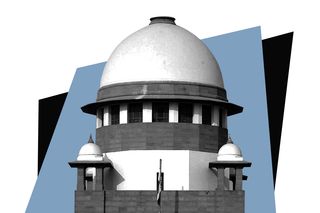
Divorce Proceedings Should Not Require Proving Partner’s Fault: Supreme Court
Divorce law in India is based on the “fault theory,” but the court noted that “two good very persons cannot always be good partners.”

A constitutional bench of the Supreme Court of India on Wednesday observed that marriages could end without any fault of either partner, simply due to irreconcilable differences, reported Hindustan Times. The bench is currently hearing a string of petitions to determine whether the Court can use Article 142 of the Constitution — which states that the Supreme Court’s decisions are enforceable throughout the territory of the nation — to dissolve marriages.
In the absence of any formal legislation that recognizes “irretrievable breakdown of marriage” as a valid ground for divorce, the Supreme Court has at times made use of its powers under Article 142 to dissolve marriages. The Court’s comments highlight the need for recognizing “no-fault” divorces as valid.
In India, divorce laws are governed under the Hindu Marriage Act, 1955, the Special Marriage Act, 1954, the Indian Divorce Act (Christian Marriages), and Muslim personal law. All of these acts recognize divorce on two grounds: contested and consensual. Contested divorce refers to divorce petitions filed by one partner on grounds of cruelty, adultery, conversion, desertion, or unsoundness of mind exhibited by the other; consensual divorce on the other hand is filed by both partners through mutual consent. Beginning legal proceedings on the latter, however, are much more complicated than the former. The petition for a consensual divorce has to be filed by both spouses and requires that the married couple passes a stipulated time as a separated couple before filing legal proceedings.
While couples married under the Hindu Marriage Act and the Special Marriage Act need to have lived separately for at least one year before filing for divorce under mutual consent, Christian couples are required to have lived separately for a minimum of two years before filing for divorce. Additionally, all couples seeking a consensual divorce have to visit the court twice: once to file their petition, and once after six months to record evidence. Chennai-based divorce lawyer Chethana V noted in an explainer from 2021, “this six-month period is known as the “cooling off period”, for the parties to re-consider and think about their decision to separate.”
Barring desertion, there are no such time limits to adhere to while filing proceedings for a contested divorce. The current decision could steer the legislature toward making it easier to seek divorce even on consensual grounds, but a larger change also needs to come from within Indian society.
In 2021, while dissolving a marriage on the grounds of irretrievable breakdown, the Supreme Court observed that one reason there is no legislature on irretrievable breakdown yet is that marriages are held as sacramental under Hindu law. Indeed, before the 1955 Hindu Marriage Act, there was no provision for divorce in Hindu marriages. The Court stated then that, “society at large does not accept divorce, given the heightened importance of marriage as a social institution in India… it is far more difficult for women to retain social acceptance after a decree of divorce. This coupled with (the) law’s failure to guarantee economic and financial security to women in the event of a breakdown of marriage is stated to be the reason for the legislature’s reluctance to introduce irretrievable breakdown as a ground for divorce.”
Related on The Swaddle:
‘Cruel’ to Deny Divorce to Partner in an Unhappy Marriage: Kerala HC
Advocate Indira Jaisingh, assisting the Court in the current proceedings, echoed a similar sentiment on Wednesday by stating, “I am in strong disagreement with judgments which indicate that marriage is a sacrament and it’s the public policy of India that we don’t break marriages.” Arguing that social norms also change with time, Jaisingh added, “arguments such as ‘marriage is a sacrament and thus, we must not agree to the theory of irretrievable breakdown,’ do not make any sense.”
In fact, the sanctity of marriage in Indian society, and the taboo around divorce, prevent women from seeking divorce even when they face abuse and cruelty in their marriage and leave them without ample support from their loved ones. Writing for The Swaddle on the gossip culture and stigma surrounding divorce, Devrupa Rakshit notes, “The fear of “log kya kahenge”…prevents families or other ecosystems of support from truly aiding the person in need.” Rakshit observes that “when we take pride in our country’s low divorce rates…we perpetuate patriarchy’s distaste of happy, independent women. Divorce…is automatically equated to disgrace. And when it seems like social disgrace is the only other alternative to abuse, motivating oneself to walk out just to be humiliated, doesn’t feel worth it.”
However, at times when the legislature is inadequate, the judiciary can step in to resolve problems spouses may face in filing for divorce. In February this year, for instance, the Kerala High Court ruled that a partner’s refusal to consent to mutual separation due to incompatible marriage would also amount to cruelty. “The law on divorce recognizes both fault and consent as a cause for separation. When both the parties are unable to lead a meaningful matrimonial life due to inherent differences of opinion and one party is willing for separation and the other party is withholding consent for mutual separation, that itself would cause mental agony and cruelty to the spouse who demands separation,” held the court during the judgment.
The example from Kerala, and the Supreme Court’s use of its powers granted under article 142, exemplify how the courts can aid in making legal recourses available to citizens in the absence of legislation. Conversations on the right to marriage must contain conversations on the right to divorce — and to divorce without facing obstacles from the state.
Amlan Sarkar is a staff writer at TheSwaddle. He writes about the intersection between pop culture and politics. You can reach him on Instagram @amlansarkr.
Related


What Makes Women‑Led Protests Different From Others?
